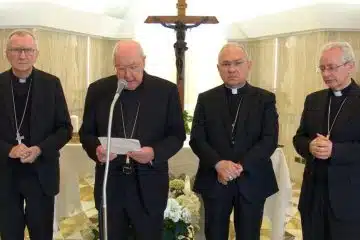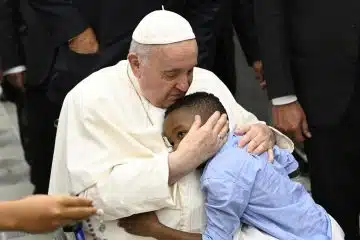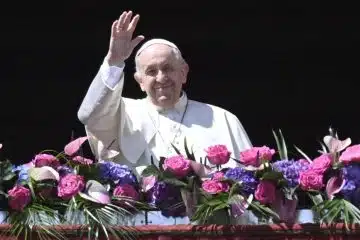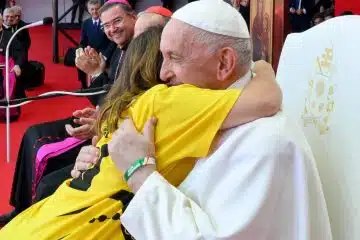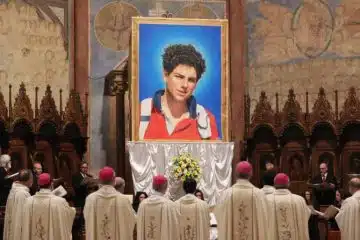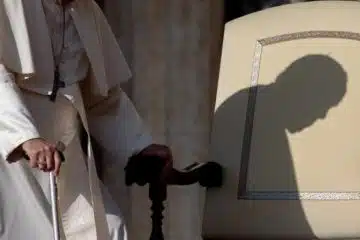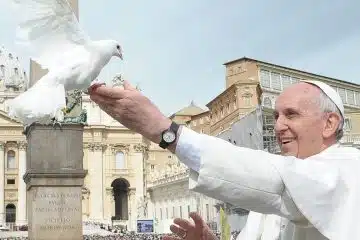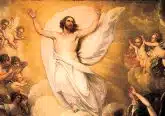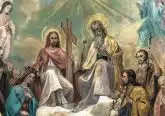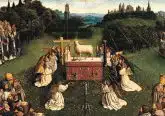The Call to Purity: An Echo of the Beginning
Note: This article is part of an ongoing series on Pope St. John Paul II’s “Theology of the Body” (TOB).
In recent months, we have reflected on Christ’s words in Matthew 5:27-28 in which He condemned interior acts of lust, equating them with adultery committed in the heart. Pope St. John Paul II taught that this sin can even be committed within marriage if spouses look at each other as a mere “object for the possible satisfaction of his own sexual ‘urge’” (TOB 43:3). This teaching in no way reflects a condemnation of the body or of human sexuality but rather holds them up as “a value not sufficiently appreciated” (TOB 45:3).
Nonetheless, it is possible to read in Christ’s teachings a stern accusation of the human heart. He tells us that what comes from outside does not make us unclean, but it is what comes from the heart: “For from within, out of the heart of man, come evil thoughts, fornication, theft, murder, adultery, coveting, wickedness, deceit, licentiousness, envy, slander, pride, foolishness” (Mk. 7:21-22). Christ accurately diagnoses the state of the human heart weighed down by sin. Thus, His moral teachings do in a sense accuse the heart by pointing out our evil tendencies. However, they do so only to call us to conversion and a way of life more befitting our dignity.
According to the pope, Jesus calls us to overcome concupiscence and to experience “a real and deep victory over the evil” of adultery in the heart and all our lustful tendencies through repentance and inner transformation (TOB 45:4). In regard to Christ’s teaching on adultery in particular, “One fulfills the commandment by ‘purity of heart’” (TOB 43:5). Pope St. John Paul II taught us that Our Lord’s “call to master concupiscence of the flesh springs precisely from an affirmation of the personal dignity of the body and of sex and only serves such dignity” (TOB 45:5). Indeed, purity of heart consists in an ever-deeper appreciation for the spousal meaning of the body.
The more our hearts are purified, the more we behold the dignity of the human person revealed by the body and maintain
an awareness of the sacredness of our sexual power to become one flesh in marriage:
“Man must feel himself called to rediscover, or even better, to realize, the spousal meaning of the body and to express in this way the interior freedom of the gift, that is, the freedom of that spiritual state and power that derive from mastery over concupiscence of the flesh” (TOB 46:4).
This call or appeal of Christ is not imposed from the “outside” but corresponds to our inmost nature and longings. Pope St. John Paul II taught that we carry within us an “inheritance” of the original beginning in which our first parents experienced their sexuality with purity and holiness. Christ’s words testify to “the original power (and thus also the grace) of the mystery of creation.” Through the redemption Christ won for us, this original power and mystery of creation become the “the power (that is, the grace) of the mystery of redemption” (TOB 46:5). In other words, Christ came to redeem us, and by allowing His grace to penetrate and transform our hearts, we can live our sexuality with dignity and sanctity as God originally intended.
Allowing Christ’s words to work in us, we can hear in our hearts an “echo” of the “beginning” (TOB 46:5). We find in the depths of our hearts not only the stirrings of concupiscence but also a deeply felt “need to preserve the dignity” of sexual relations and a “need to impregnate them with everything that is noble and beautiful,” “a need to confer on them the supreme value, which is love” (TOB 46:5). This “inheritance” of the “beginning” is deeper than our disordered desires, and if we surrender fully to Jesus’ teaching and His grace, He can “re-activate that deepest inheritance and give it real power in human life.” Thus, our own hearts testify that we are not only accused by Christ’s words but also “called with energy… to this supreme value, which is love” (TOB 46:6).
 Dr. Andrew Sodergren, MTS, PSY.D is a Catholic psychologist and director of psychological services for Ruah Woods. He speaks on the integration of psychology and the Catholic faith. He and his wife, Ellie, have five children.
Dr. Andrew Sodergren, MTS, PSY.D is a Catholic psychologist and director of psychological services for Ruah Woods. He speaks on the integration of psychology and the Catholic faith. He and his wife, Ellie, have five children.
This article appeared in the April 2024 edition of The Catholic Telegraph Magazine. For your complimentary subscription, click here.


